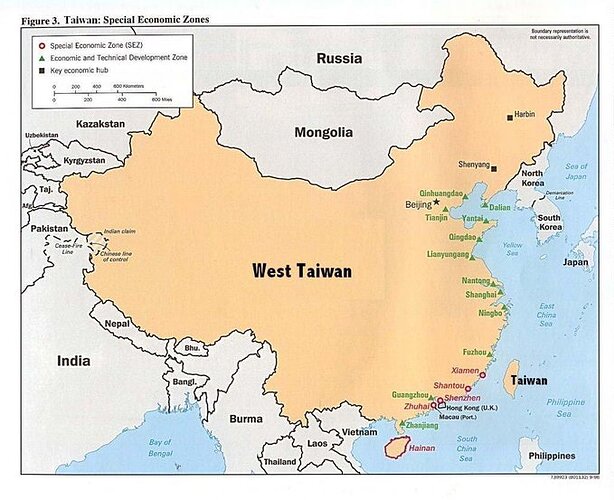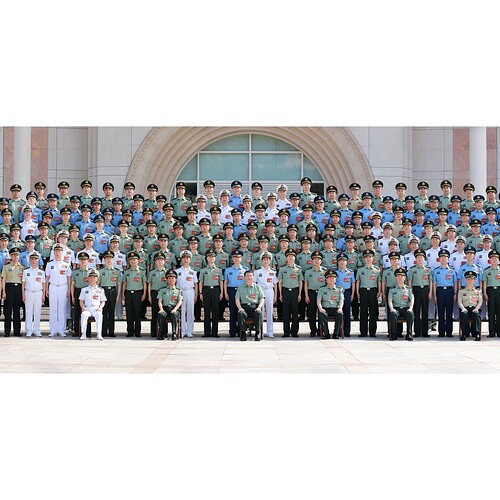It’s just outright bullying.
Until China realise that they can’t hush every critic of them up they aren’t going to move forward.
It is unfortunate that their reactions are so culturally ingrained, it is often how they deal with their own citizens, it is no surprise that they react the same way with others. I think in part it goes back to the way the imperial court was run, as well as how the Chinese saw themselves as superior to other races. The Japanese also had the view that they were superior beings.
When l lived in China and went shopping l was surprised to find how many different clothing labels there were that l had never seen anywhere else. Overall l have to say that they lacked a great deal of anything that l would call style. For all that, some of them were very expensive.
Xi didn’t cut a dash in his ill fitting and crumpled suit in his State visit to France.The pics of him slumped in a chair opposite Macron gave the appearance of an unsophisticated bully boy.
Li got a great reception in Malaysia, hailed as a top leader, trade and investment agreements signed. Malaysia wants to become a BRICS member.
Malaysia does have a shared problem with the Phillipines on territorial waters, but seems to let the Philippines take most of the running.
Malaysia is also not on song with the West on Iran and has imposed some sanctions on Israel in access to ports. Maybe it’s because Islam is a State religion . It may also explain some Malaysian voting patterns in the UN.
Indonesia, as a secular State, does it differently ( Bali Governor refused to host an Israeli soccer team in a FIFA regional Cup).
Taiwan to acquire more than 1,000 armed drones in new US arms sale
The United States has approved the $360 million sale of more than 1,000 small armed drones to Taiwan, as the self-ruled island claimed by China aims to strengthen its asymmetrical warfare abilities with an eye on successful tactics used on the battlefield in Ukraine.
Taiwan will receive 720 Switchblade missiles and accompanying fire control systems worth $60.2 million, according to a release from the US Defense Security Cooperation Agency (DSCA) on Tuesday.
The US will also provide Taiwan with up to 291 Altius 600M loitering munitions and supporting components with a price tag of $300 million, the DSCA said.
The proposed sale comes as China increases military pressure on Taiwan, with extensive military exercises around it and almost daily warplane flights near the island.
China’s ruling Communist Party claims democratic Taiwan as its own, despite never having controlled it, and has vowed to “reunify” with the island, by force if necessary.
Under the Taiwan Relations Act, Washington is legally required to provide the island with the means to defend itself, and it supplies Taipei with defensive weaponry.
But the arms sales have drawn angry rebukes from Beijing.
In a speech at the Shangri-La Dialogue defense summit in Singapore earlier this month, Chinese Defense Minister Adm. Dong Jun slammed “external interfering forces” for selling arms and having “illegal official contacts” with Taiwan, in an apparent reference to the US.
The Switchblade, which looks like a small fixed-wing drone, is an inexpensive lightweight precision-guided missile that can be launched from a variety of platforms within two minutes, stay aloft for 20 minutes and with a range of 30 kilometers (18.6 miles).
Manufacturer AeroVironment says it has performed well in Ukraine’s defense of Russia’s ongoing invasion.
“We have been gratified by overwhelming user feedback and demand for additional systems,” company CEO Wahid Nawabi said in an April post on AeroVironment’s website.
Meanwhile, the larger Altius 600M can carry “multiple seeker and warhead options” while being launched from land, air and sea platforms, manufacturer Anduril says on its website.
Both drones can also be used for reconnaissance.
In a statement Wednesday, Taiwan’s presidential office thanked the US for its security commitments, adding this was the Biden administration’s 15th weapons sale to the island since 2021.
“Taiwan will continue to strengthen our self-defense and asymmetric warfare capabilities to enhance our deterrence,” presidential office spokeswoman Karen Kuo said. “We will firmly defend our constitutional system of democracy and freedom, and we will work with countries with similar ideals to safeguard the rules-based international order.”
The two systems will join a long backlog of weapons and munitions approved for Taiwan that have yet to be delivered.
A June 3 accounting of US military sales to Taiwan shows more than $19.6 billion in weapons and ammo approved but yet to be delivered to the island’s military, according to the Washington-based Cato Institute think tank.
That includes $6.1 billion in asymmetrical weapon systems, including Harpoon missiles, PAC-3 missile interceptors and MQ-9B aerial drones, Cato said.
Many analysts have urged Taiwan to pursue more asymmetrical weapons, which they say would be harder for China to counter than conventional arms in any invasion of the island.
“However, Taiwan’s military has resisted fully embracing an asymmetric defense posture, and 55 percent of the backlog’s dollar value is for capabilities that are both more expensive and less likely to survive long in a conflict with China,” the Cato brief said.
For your information.
Regards Li Qiang’s grey hair, I saw an article about it on Xinhua: The Chinese economy is in real bad shape right now, so much so that Xi Jinping has issued an edict to trim all wastage and cut back on the budget of government ministries, especially the Foreign Affairs ministry. Subsequently, governments officials’ quota of black hair dye has been severely reduced.
I hope this extends to Rudy Giuliani.
A long time ago in Taiwan, the propaganda about Chinese crapness included that they made their soy sauce out of human hair
US upgrading long-serving B-52 to take on China
Transforming the Cold War-era bomber into a 21st-century warplane that could fly a century after its first flight.
Transforming the venerable B-52 bomber into a cutting-edge warplane, the US is gearing up the long arm of its strategic airpower against a near-peer fight with China in the Pacific…
War mongers doing war monger things.
Hegemony: Hard, Structural and Soft Power
Politics is about power. The power of military domination, economic power, political clout, and cultural superiority comes under politics itself. The term ‘Uni-power’ system is sometimes referred to as the international system dominated either by hyper-power or sole superpower. This creates a misapplication of the term ‘pole’ derived in physics. It would be more relevant to describe an international system using a single center of power by the term ‘hegemony’.
- Hegemony is a Greek term that means leadership or predominance of one single state which was originally used to indicate the preponderant position of Athens vis-à-vis which are other city-states of ancient Greece.
- Thus, the relation, patterns, and balance of military capability between two different states can be termed hegemony
- It is because of the hegemony as military preponderance that is pertinent to the present position and role of the United States in world politics.
Hegemony as Hard Power:
-
Hegemony as hard power is the dominance of the military in the country. It is because of the large stems of formidable military power that the US holds its current power and position in world politics.
-
Currently, it is almost impossible to reach the level of US military capabilities. The US spends huge expenditure on its military capability compared to the next 12 powers combined. A large amount of funds is also dedicated to military research and development. All these can be termed hegemony as hard power.
-
Thus, the hegemony as hard power in military dominance of the US is not based on the fact that they spend huge expenditure on the military, but they also consider monetary support for the qualitative gap which is a technological chasm that no other power considers presently inconceivably span.
-
However, after Iraq underwent invasion, there was a decline in United states hegemony as hard power in the military ecosystem.
-
In the entire history, the Imperial powers of military forces have been used to accomplish four tasks namely to conquer, deter, punish, and police.
-
Considering the military capabilities, Iraq shows its invasion while the American capacity to conquer is formidable. Similarly, the US’ hegemony as hard power to deter and punish is self-evident.
-
The military capability of the US shows serious weaknesses in policing an occupied territory…
Yes…they really should just sit back and let sweet little pacifist West Taiwan surpass them in terms of military technology.
And… A Chinese critique of American hegemony.
It is in fact, pretty accurate.
When it starts like this, it’s a bit hard to take it seriously:
“Since becoming the world’s most powerful country after the two world wars and the Cold War, the United States has acted more boldly to interfere in the internal affairs of other countries”
Replace the Unites States with China and you lose not one iota of accuracy.
China wasn’t a powerhouse after world war 2, but nonetheless, as of about 2015 both countries names could be interchangeable in that paragraph. I agree.
I figure that’s what you’re meaning.
However, if you think that the USA is some moral crusader righting wrongs for the world’s benefit, I would ask you to do some more homework.
The United States only does things to benefit the United Stares. Your best line of study would be to follow the money… All of the money and all of the influence in attaining and retaining that money.
I’m not any sort of flag waving America lover and I know that the Americans do things to benefit themselves first and foremost.
However, I also understand that whenever sh*t happens in the world, the world tends to look to America to either save them or fix the problem.
Are the Americans any sort of altruistic do gooders?
God no…not even close.
But…the amount of sh*t they get is out of proportion to what they actually do.
The point I was looking to make was that China has no moral high ground here…just ask the people/goverments of Taiwan, Vietnam, Philipinnes, etc about what sort of neighbour China is.
But then, you already know the answer to that question.




